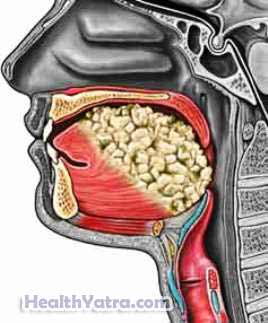Definition
Tongue cancer is a subgroup of head and neck cancer. Cancer develops from the squamous cells of the tongue. This leads to a local tumor growth with spreading later.
Cancer occurs when cells in the body, in this case tongue cells, divide without control or order. Normally, cells divide in a regulated manner. If cells keep dividing uncontrollably when new cells are not needed, a mass of tissue forms, called a growth or tumor. The term cancer refers to malignant tumors, which can invade nearby tissues and can spread to other parts of the body. A benign tumor usually does not invade or spread.
Tongue cancer is often grouped with other mouth cancers, such as cancer of the lips, hard palate, cheek lining, the portion of the mouth underneath the front of the tongue, or gums. These cancers are collectively known as oral cavity cancer.

Causes
The exact cause of tongue cancer is unknown. However, the following lifestyle factors may be related:
- Smoking cigarettes, cigars, or a pipe
- Use of chewing tobacco, snuff, or other tobacco products
- Heavy alcohol consumption
Risk Factors
Factors that can increase your chance of developing tongue cancer include:
- Sex: male
- Poor oral and dental hygiene
- Age: 40 and over
- Irritation of the mucous membranes in the mouth due to smoking and drinking
- History of mouth ulcers
- Family history
Symptoms
If you have any of these symptoms do not assume it is due to tongue cancer. These symptoms may be caused by other conditions.
- Lesion, lump, or ulcer on the tongue
- Difficulty swallowing
- Mouth sores and mouth pain
- Numbness or difficulty moving the tongue
- Change in speech due to inability to move the tongue over the teeth when speaking
- Pain when chewing and speaking
- Bleeding from the tongue
Diagnosis
Tongue cancer may be detected by your dentist during a routine dental cleaning, or by your doctor during a routine physical exam.
To confirm diagnosis, your doctor will ask about your symptoms and medical history. A physical exam will be done. This may include examining your tongue for lumps or masses. A fiberoptic scope may be used.
- Your tongue tissue may need to be tested. This can be done with biopsy.
- Images may need to be taken. This can be done with:
- Computed tomography (CT) scan
- X-ray
Treatment
When tongue cancer is found, staging tests are done to find out if the cancer has spread. Treatment depends on the stage of the cancer and the size and location of the tumor.
Surgery
This is surgical removal of the cancerous tumor and nearby tissue, and possibly nearby lymph nodes. This is often the preferred treatment when the tumor is on the visible side of the tongue, when it is less than 2 cm, and when it is on one side and does not involve the base of the tongue.
Radiation Therapy (or Radiotherapy)
This is the use of radiation to kill cancer cells and shrink tumors. This method is used when the cancer is at the back of the tongue.
Chemotherapy
Chemotherapy is sometimes used with radiation to destroy the cancerous growth, especially if surgery is not planned.
Rehabilitation and Follow-Up
After treatment, your doctor may recommend:
- Therapy to improve tongue movement, chewing, and swallowing
- Speech therapy, if use of the tongue is affected
- Close monitoring of your mouth, throat, esophagus, and lungs to see if the cancer has come back or spread
Prevention
To help reduce your chance of getting tongue cancer, take the following steps:
- Don’t smoke or use tobacco products. If you do smoke or use tobacco products,get help to quit.
- Avoid heavy alcohol consumption.
- See your doctor regularly for check-ups and cancer screening exams.
